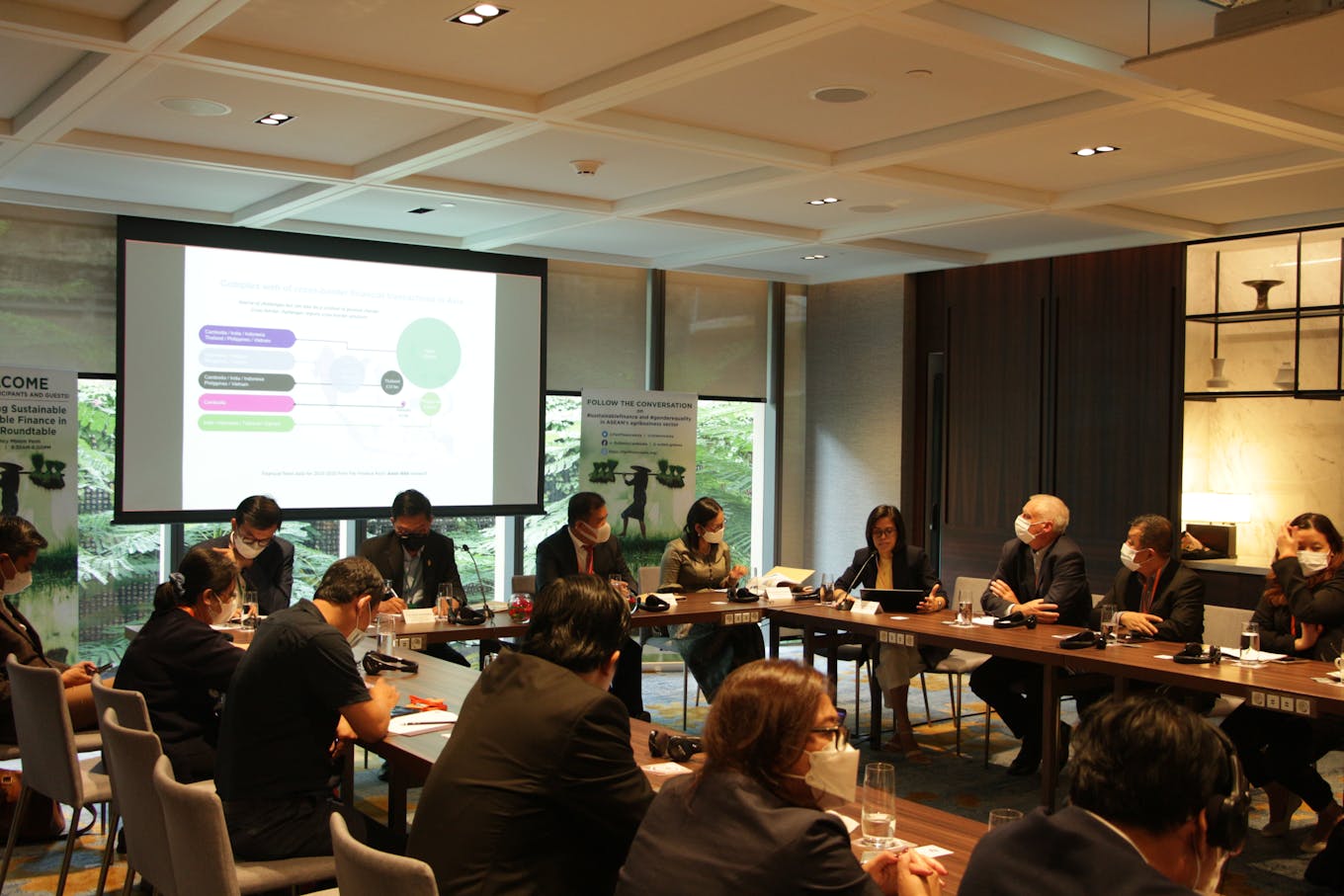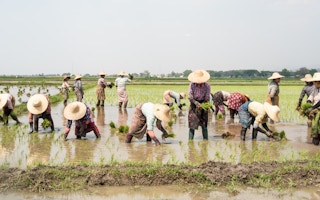New research indicates that financial institutions in Southeast Asia are neglecting to set strong socially-aligned preconditions before they lend to agribusinesses, hence indirectly supporting irresponsible business practices that often lead to human rights abuses, labour rights violations, gender-based discrimination, and other social harms. There are now renewed calls from civil society for the Association of Southeast Asian Nations (Asean), the region’s 10-member bloc, to step in with tougher regulations.
In a policy brief submitted by civil society organisations to the Cambodian government, ahead of the Asean summit that the country chaired in November, the regional grouping was urged to establish a non-judicial grievance mechanism for affected workers and vulnerable communities to “seek remediation”, as well as engage with individual governments on defining sustainable finance taxonomies that uphold human rights and social standards, among other recommendations.
Effective enforcement tools need to be in place to monitor the financial sector, particularly banks operating in Southeast Asia, and ensure that they are in compliance with widely-adopted international or regional guidelines on responsible financing or human rights, according to the policy brief.
“Labour rights and gender equality granted and assured through various laws at national levels, remain insufficient in protecting workers from exploitative activities in the food and agricultural sector,” the brief added.
Pressure is mounting on financial institutions to integrate environmental and social risks in their business operations, it noted, but not much has been done to alter the “business-as-usual conduct” of agribusinesses that they lend to.
Fair Finance Asia (FFA), a regional network of over 90 allied civil society organisations engaged in sustainable finance advocacy, developed the policy brief in collaboration with the Gender Transformative and Responsible Agribusiness Investments in Southeast Asia (GRAISEA). In the brief, both called for “stronger due diligence” in the Asean financial sector, and identified areas where the regional grouping can adopt tougher regulations.
As Southeast Asia moves to establish benchmarks for evaluating green investments by developing a common taxonomy for the region, observers have pointed out that one critical requirement is lacking in the proposed new framework: respect for human rights.
In the policy brief, FFA and GRAISEA recommended for Southeast Asian governments to adopt sustainable finance taxonomies that consider the rights and challenges of vulnerable marginalised communities, and address gender equalities. They also suggested for the national governments to set up a multi-stakeholder task force to engage with the Asean Board of Taxonomy.
The Asean Taxonomy is seen as a classification system that will help harmonise currently varied criteria for what makes an investment “sustainable” in Southeast Asia, but its current iteration lacks socially-aligned safeguards. Its objectives now include climate change and adaptation, protection of biodiversity, and transition to a circular economy, among others.
Stakeholder consultations on Version 1 of the Asean Taxonomy, released in November last year, are ongoing.
Asean also currently has in place a set of guidelines for promoting responsible investment in food, agriculture and forestry, or what is known as the Asean RAI, but FFA and GRAISEA, in the policy brief, highlighted that enforcement mechanisms need to be in place to ensure that the financial sector is complying with the guidelines, also developed due to enhanced scrutiny from civil society. In Cambodia’s context, the document said that the process should involve civil society organisations, and allow a space for non-judicial conflict resolution.
Cambodia held the rotating chair position of the regional grouping this year, and the baton has just been passed to Indonesia.
Due diligence needed from banks
Bernadette Victorio, programme lead at FFA, at a roundtable discussion held in Phnom Penh in September to address how agribusinesses and the banks that finance them can take up more responsibility for their lending decisions, said that cross-border compliance mechanisms need to be in place to ensure that transnational financing flows that cause social harms such as worker rights’ violations are not left unchecked.
An FFA-GRAISEA study published in March revealed that financial institutions in Asia are, for example, turning a blind eye to poor social practices in their agri-investments. Violations include gender-based discrimination, forced and child labour, human trafficking or lack of protection for land rights. On average, the 54 financial institutions actively financing agribusinesses in Asia that the study assessed – including some of the largest banks in Southeast Asia such as Singapore’s DBS Bank and Malaysia’s CIMB Group – scored 2 out of 10 for gender equality, human rights, labour rights, as well as transparency and accountability.
This was measured using the Fair Finance Guide International (FFGI) methodology that assesses the responsible investment and finance policies of financial institutions.
“Most Asean financial institutions, particularly banks, perform poorly in addressing sustainability issues pertaining to gender equality, labour rights, transparency and accountability, among others,” said FFA and GRAISEA in the latest policy brief.
“Most banks did not consider human rights issues in their transactions. All banks remain silent on conflicts over land rights, and none of the banks assessed included living wage and a cap to maximum working hours when dealing with clients.” These are despite evidence that all these are issues that trouble the agriculture sector in Asia.

In September, FFA and GRAISEA conducted a roundtable discussion where feedback was gathered from representatives of government, financial institutions, the private sector and civil society on how policy asks related to sustainable finance and gender can be refined. This feedback was consolidated into a policy brief submitted to the 2022 Asean Chair under Cambodia in October. Image: FFA
The research found that 125 of the largest agribusinesses in Asean, India, Japan and Pakistan received US$2.6 billion from global and regional financial institutions, but “90 per cent of them ignored issues related to gender equality and women’s rights”.
“We have a complex web of cross-border financial transactions across Asia, and this is the challenge. Many of the financial institutions currently enabling businesses do not have practices that are in line with international human rights, labour and gender equality standards,” said Victorio.
Feedback and suggestions from the roundtable, convened with representatives from government, banks and civil society in attendance, were incorporated in the policy brief submitted to Asean. This included recommendations for protections and safeguards to be in place for human rights defenders.
A set of recommendations directed at regional financial institutions was also included, with some tailored to help Cambodian banks and government improve their practices. FFA-GRAISEA suggested that the financial sector integrate sustainability standards and regulations across their business operations, comply with international conventions such as the International Labour Organisation (ILO)’s Declaration on Fundamental Principles and Rights at Work, as well as set pre-conditions for businesses that want to access finance and investment capital.
The pre-conditions should include transparency and disclosure when it comes to adherence of international or national standards, said the brief.
“
We have a complex web of cross-border financial transactions across Asia, and this is the challenge. Many of the financial institutions currently enabling businesses do not have practices that are in line with international human rights, labour and gender equality standards
Bernadette Victorio, programme lead, Fair Finance Asia
For Cambodia, it recommended for financial institutions to consider developing social indicators for their investment and lending risk matrix that are aligned with international guidelines. Access to remedy for workers impacted should be established, and a mechanism that enables “constructive dialogue between impacted communities and civil society organisations” put in place.
Speaking at one of the plenary sessions, Thai human rights lawyer Sor Rattamanee Polkla highlighted how Thai banks have lent billions of dollars to multiple hydropower projects in Laos, including the Xayaburi, a run-of-river hydroelectric dam built on the Lower Mekong River. In August, a legal case that had been ongoing for 10 years, filed by activists who believed that the power purchase agreement was causing significant damage to the rich biodiversity of the river and residents’ livelihoods, was dismissed by the Thai court.
Polkla told Eco-Business that the case shows that responsible financing is still lacking in Thai law, as well as in jurisdictions across Southeast Asia. “Stronger cross-border compliance mechanisms need to be in place to ensure due diligence, and less of such repeat cases,” she said. “It is to ensure that local communities have something to fall back on.”
Mainstreaming gender-inclusive policies – challenges exist
Government and legislative representatives from Cambodia attending the roundtable acknowledged some of the concerns with regards to the lack of access to financial data, and the need to mainstream gender-inclusive policies in Cambodia.
The Chhunhak, director general, gender equality and economic development, at the Ministry of Women’s Affairs said that there are plans to expand the formal sector for women working in the agribusiness sector in Cambodia. It is working with international institutions such as the World Bank to “convert” women farm workers, traditionally informal workers who might be unpaid, into “women entrepreneurs” who would be able to enjoy enhanced rights.
The also emphasised the importance of financial literacy and education among agriculture workers. “Money is important,” he said. “But if money is used in the wrong way, it may become debt.”
Sok Voeurn, chairman of the board of the Cambodia Microfinance Association told Eco-Business that responsible finance principles are “largely in place” in lending practices, but microfinance organisations still struggle to understand more sophisticated social performance metrics.
FFA and GRAISEA, in the policy brief, highlighted that women’s access to credit and financial products must be improved. For example, this can be done by promoting affirmative action for women-led enterprises, removing discriminatory requirements for access to lending, as well as setting national gender goals on procurement and commerce.
The food and agriculture sector is the largest employer in Asia, serving as the backbone of national economies. Women are often hired as informal workers by agribusinesses, which means that they cannot access key protections and benefits under the labour law, and are more vulnerable to rights violations.
Banks must pull their weight
Rene Frechet, an international agribusiness finance specialist at the Asian Development Bank (ADB), highlighted at the plenary session how a grievance mechanism must be made easy for financial institutions to operate.
“For ADB, we currently require financial institutions to comply with a set of rules under our environmental and social management system, in order for them to access our credit lines. There is continuous monitoring, and if we do receive a complaint, it is ultimately for ADB to cut the funding to these financial institutions. The mechanism needs to be established at a level that can be implemented,” he said.
Such a mechanism is exactly what the FFA is advocating for, where socially-aligned conditionalities are attached to lending and are regularly implemented and monitored, said Victorio. In the policy brief, FFA-GRAISEA adds that through credit and investments, financial institutions can exercise significant influence over the practices and policies of the companies they invest in. However, when banks do not consider the potential or actual adverse impacts on people and local communities, they end up facilitating gender-based and human rights violations, and are “exposed to significant financial and reputational risks of their own”.
“We are calling for financial institutions with leverage to enshrine good practices in their policy when they lend to the private sector,” said Victorio.






















